Research
Internet Monitor produces a number of research publications throughout the year, ranging from short analyses of notable events or trends related to Internet access, control, and activity to our annual report, which highlights some of the most fascinating developments and debates in the digitally networked environment each year.
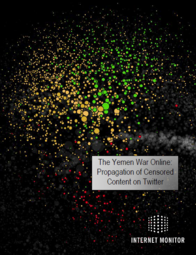
The Yemen War Online: Propagation of Censored Content on Twitter
February 2018
Helmi Noman, Robert Faris, John Kelly
This report analyzes information sharing on Twitter among different political groups related to the ongoing conflict in Yemen. We find that the networks on Twitter are organized around and segregate along political lines. The networks cite web content, including censored websites, that reflects and informs their collective framing of the politically sensitive issues. Each of the factions relies almost entirely on their own sources of information. We also test for the availability of this open web content shared on Twitter in the countries most engaged in the public debate over the conflict and find that national filtering policies also seek to shape the narrative by blocking views and perspectives that diverge from government positions on the conflict. While selective exposure to web content is often associated with polarization, we show that social media—in this case Twitter—is used to propagate censored content from the open web, making it more visible to users behind open-web filtering regimes.
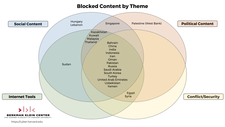
The Shifting Landscape of Global Internet Censorship
June 2017
Justin Clark, Robert Faris, Ryan Morrison-Westphal, Helmi Noman, Casey Tilton, and Jonathan Zittrain
This study, conducted by the Internet Monitor project at the Berkman Klein Center for Internet & Society, documents the practice of Internet censorship around the world through empirical testing in 45 countries of the availability of 2,046 of the world’s most-trafficked and influential websites, plus additional country-specific websites. The study finds evidence of filtering in 26 countries across four broad content themes: political, social, topics related to conflict and security, and Internet tools (a term that includes censorship circumvention tools as well as social media platforms). The majority of countries that censor content do so across all four themes, although the depth of the filtering varies.
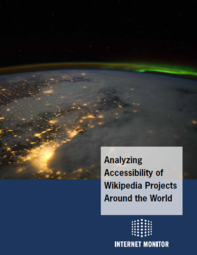
Analyzing Accessibility of Wikipedia Projects Around the World
May 2017
Justin Clark, Robert Faris, and Rebekah Heacock Jones
This study, conducted by the Internet Monitor project, analyzes the scope of government-sponsored censorship of Wikimedia sites around the world. The study finds that, as of June 2016, China was likely censoring the Chinese language Wikipedia project, and Thailand and Uzbekistan were likely interfering intermittently with specific language projects of Wikipedia as well. The report features insights into the state of access to Wikipedia content in 15 select countries.
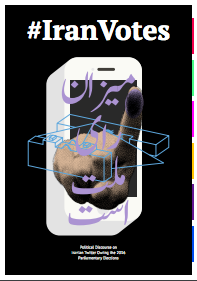
#IranVotes: Political Discourse on Iranian Twitter During the 2016 Parliamentary Elections
June 2016
Authored by James Marchant, Amin Sabeti, Kyle Bowen, John Kelly, and Rebekah Heacock Jones
“#IranVotes: Political Discourse on Iranian Twitter During the 2016 Parliamentary Elections,” a report in partnership with Small Media, maps and analyzes the content and structure of the Iranian Twittersphere over the course of the 2016 legislative elections in order to identify the communities that developed around various political, social, and cultural issues and to assess the influence of online political campaigning on the platform.
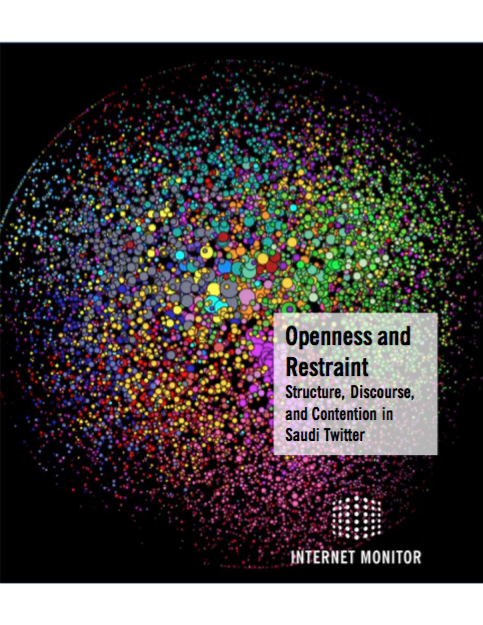
Openness and Restraint: Structure, Discourse, and Contention in Saudi Twitter
December 2015
Authored by Helmi Noman, Robert Faris, and John Kelly
“Openness and Restraint,” authored by Helmi Noman, Robert Faris, and John Kelly, maps and analyzes the structure and content of the Saudi Twittersphere and identifies the communities that coalesce around different political, religious, social, and cultural topics and viewpoints.
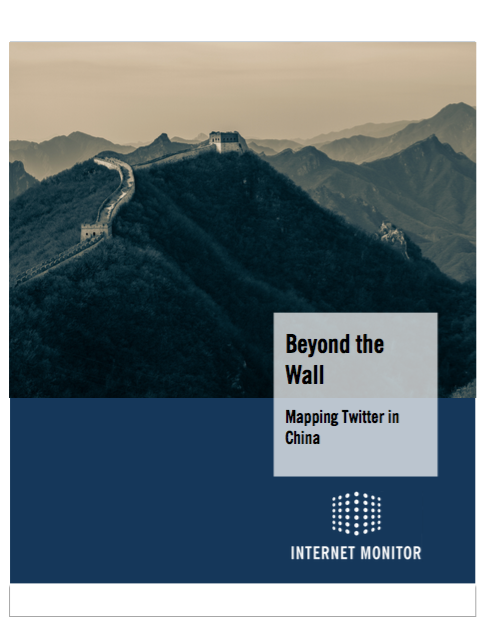
Beyond the Wall: Mapping Twitter in China
November 2015
Authored by Sonya Yan Song, Robert Faris, and John Kelly
"Beyond the Wall: Mapping Twitter in China," authored by Sonya Yan Song, Robert Faris, and John Kelly, maps and analyzes the structure and content found on Twitter centered around users in mainland China, offering a rare look at the activity of Chinese Internet users on a platform that is largely unregulated by the state and only reachable through the use of tools that circumvent state-mandated Internet filters.
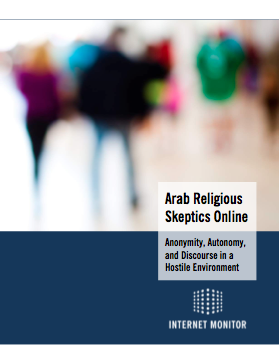
Arab Religious Skeptics Online: Anonymity, Autonomy, and Discourse in a Hostile Environment
February 2015
Authored by Helmi Noman
"Arab Religious Skeptics Online: Anonymity, Autonomy, and Discourse in a Hostile Environment," authored by Helmi Noman, analyzes the content, discourse, and structure of three prominent Arab atheist web forums and examines the relationship between the networked information economy and the emergence of religious skeptics in Arab cyberspace.
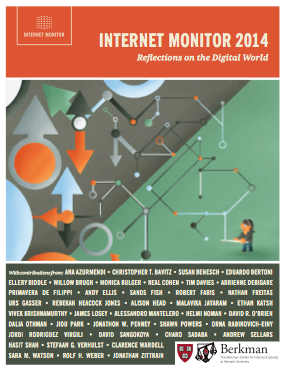
Internet Monitor 2014: Reflections on the Digital World
December 2014
Multiple authors
The Internet Monitor project's second annual report is a collection of roughly three dozen short contributions that highlight and discuss some of the most compelling events and trends in the digitally networked environment over the past year. The publication, intended for a general interest audience, covers a broad range of issues and regions, including an examination of Europe’s “right to be forgotten," a review of the current state of mobile security, an exploration of a new wave of movements attempting to counter hate speech online, and a speculative fiction story exploring what our increasingly data-driven world might bring. The report focuses on the interplay between technological platforms and policy; growing tensions between protecting personal privacy and using big data for social good; the implications of digital communications tools for public discourse and collective action; and current debates around the future of Internet governance.
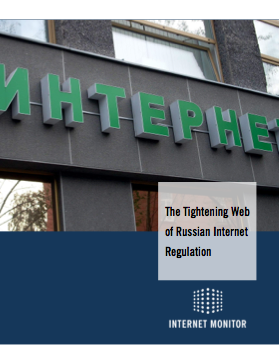
The Tightening Web of Russian Internet Regulation
November 2014
Authored by Andrey Tselikov
"The Tightening Web of Russian Internet Regulation," authored by Andrey Tselikov, tracks the systematic increase of Internet regulation in Russia from 2012-2014.
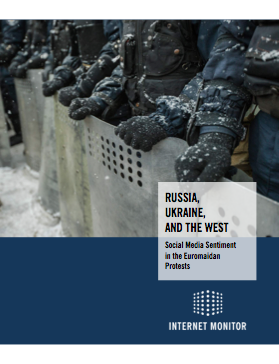
Russia, Ukraine, and the West: Social Media Sentiment in the Euromaidan Protests
October 2014
Authored by Bruce Etling
"Russia, Ukraine, and the West: Social Media Sentiment in the Euromaidan Protests," authored by Bruce Etling, analyzes content from a range of online Russian- and English-language sources, including both social media (Facebook, Twitter, and forums) and traditional media, to explore sentiment in the online conversation about the Euromaidan protests in Ukraine last winter.
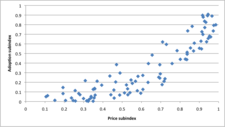
A Hackable Access Index
July 2014
Authored by Robert Faris
"A Hackable Access Index," authored by Robert Faris, describes how Internet Monitor developed our Access Index, a user-configurable index that captures Internet access from several angles. This short report analyzes in detail the Index's four sub-indices—Internet adoption, speed & quality, price, and gender equality & education—and offers reflections on summary indicators and country indices in general.
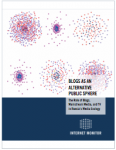
Blogs as an Alternative Public Sphere: The Role of Blogs, Mainstream Media, and TV in Russia’s Media Ecology
April 2014
Authored by Bruce Etling, Hal Roberts, and Robert Faris
"Blogs as an Alternative Public Sphere: The Role of Blogs, Mainstream Media, and TV in Russia’s Media Ecology," authored by Bruce Etling, Hal Roberts, and Robert Faris, uses data collected from thousands of blogs, mainstream media, and TV sources to examine the role of Russian blogs within Russia's media ecosystem.
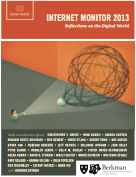
Internet Monitor 2013: Reflections on the Digital World
December 2013
Multiple authors
The Internet Monitor’s first-ever annual report is a collection of essays from roughly two dozen experts around the world, including Bruce Schneier, Ashkan Soltani, Ron Deibert, Molly Sauter, Zeynep Tufekci, and Viktor Mayer-Schönberger, among others. Intended for a general interest audience, the report highlights some of the most fascinating developments and debates in the digitally networked environment over the past year. A common thread explores how actors within government, industry, and civil society are wrestling with the changing power dynamics of the digital realm.
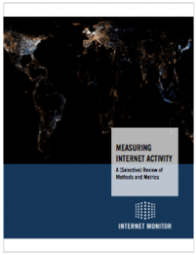
Measuring Internet Activity: A (Selective) Review of Methods and Metrics
November 2013
Authored by Robert Faris and Rebekah Heacock
“Measuring Internet Activity: A (Selective) Review of Methods and Metrics,” authored by Robert Faris and Rebekah Heacock, explores current efforts to measure digital activity within three areas: infrastructure and access, control, and content and communities.
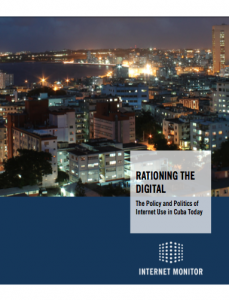
Rationing the Digital: The Policy and Politics of Internet Use in Cuba Today
July 2013
Authored by Ellery Roberts Biddle
“Rationing the Digital” explores Cuba’s complex economy of Internet connectivity, how digital expression is regulated in the country, and how recent developments in infrastructure might change the shape of access and use on the island.